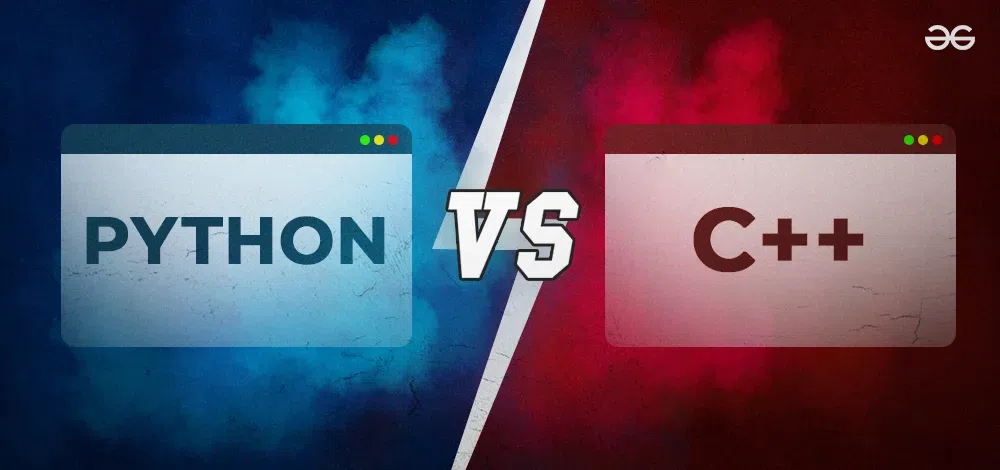Difference between Python and C++
Last Updated :
14 Jul, 2023
Python and C++ both are the most popular and general-purpose programming languages. They both support Object-Oriented Programming (OPP) yet they are a lot different from one another. In this article, we will discuss how Python is different from C++.

What is Python?
Python is a high-level, interpreted programming language. It was invented back in 1991, by Guido Van Rossum. Python is an object-oriented programming language that has enormous library support making the implementation of various programs and algorithms easy. Its language constructs and object-oriented approach aim to help programmers to write clear, logical code for various projects.
What is C++?
C++ is a high-level, general-purpose programming language created by Bjarne Stroustrup in 1979 as an extension of the C programming language, or “C with Classes”. The language has expanded significantly over time, and modern C++ has object-oriented, generic, and functional features in addition to facilities for low-level memory manipulation. Many of the technologies as libraries in Python have underlying C++ code.
Difference Between C++ vs Python
The following table shows the key difference between Python and C++ programming languages.
|
Code
|
Python has fewer lines of code
|
C++ tends to have long lines of code
|
|
Syntax
|
It uses short-hand syntax and has numerous short-hand structural iterators. It requires ‘self’ as a parameter to any class instance method. Some of the short-hand syntaxes are confusing (e.g. `rkwargs`) but rarely is anything in Python completely esoteric.
|
It has a stiff learning curve as it has lots of predefined syntaxes and structures. C++ uses implicitly ‘this’ to refer to class instances. Some syntax in C++ is extremely esoteric.
|
|
Compilation
|
Python is interpreted
|
C++ is precompiled
|
|
Speed
|
It is slower since it uses an interpreter and also determines the data type at run time
|
It is faster once compiled as compared to python
|
|
Efficiency
|
Specialized formatting not common in other languages, script-like language, OOP features, code reuse through libraries
|
C-like syntax, powerful OOP features and operator overloading, best compile-time optimizer
|
|
Nature
|
It is dynamically typed.
|
is statically typed
|
|
Functions
|
Python Functions do not have restrictions on the type of the argument and the type of its return value
|
In C++, the function can accept and return the type of value which is already defined
|
|
Scope of Variable
|
Variables are accessible even outside the loop
|
The scope of variables is limited within the loops
|
|
Extension
|
Python programs are saved with the .py extension
|
C++ programs are saved with the .cpp extension
|
|
Popularity
|
It has huge community support. When it comes to popularity, beginner and novice programmers tend to turn to Python
|
It also has dedicated followings online. But only the people who have some experience in the field show a lot of interest in C++
|
|
Garbage Collection
|
It supports garbage collection
|
It doesn’t support garbage collection, but it can be implemented
|
|
Rapid Prototyping
|
Rapid Prototyping is possible, with easy project setup, live interpreter
|
Rapid Prototyping is possible, but project setup can be complicated, live interpreter through IRC bot
|
| Application Domain |
Web development, data analysis, scientific computations, etc |
Game development, embedded systems, etc |
| Variable Declaration |
Variables are declared by simply writing their name with their datatype |
While declaring a variable it is necessary to mention its datatype |
| Installation on Windows |
Difficult to install on Windows |
Easy to install on Windows |
Conclusion
Python leads to one conclusion: Python is better for beginners in terms of its easy-to-read code and simple syntax. Additionally, Python is a good option for web development (backend), while C++ is not very popular in web development of any kind.
Python is also a leading language for data analysis and machine learning. While it is possible to use C++ for machine learning purposes as well, it is not a good option. In terms of simplicity, Python is much easier to use and has a great support system when it comes to AI and ML frameworks.
Share your thoughts in the comments
Please Login to comment...